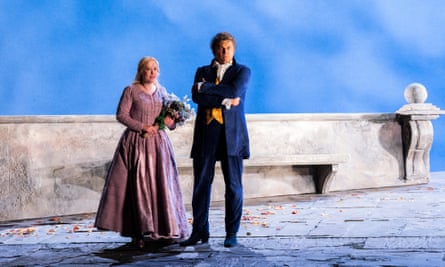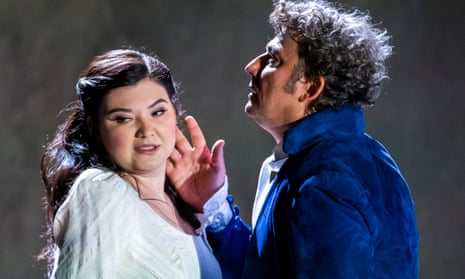Few musical directors would choose to conduct three such different operas as Verdi’s Il trovatore, Berg’s Wozzeck and now Massenet’s Werther side by side in the space of a month, but that’s how Antonio Pappano is wrapping up his penultimate season in charge of the Royal Opera – and his orchestra, after 21 years in his care, is on fabulous form. In Werther his players are indeed busy, tirelessly painting the scene under the vocal lines in music of golden-age Hollywood lushness: Massenet was not of the opinion that less is more.
Benoît Jacquot’s production is nearly 20 years old, but in its first act you might think you’d gone back 80. Lit in sunset tones by Charles Edwards, it is a comfortable, big-scale, traditional staging that occasionally sparks to life dramatically but exists mainly as a vehicle for a star tenor – this time, Jonas Kaufmann.
Not that the title character is much of a hero: Massenet’s truncated treatment of Goethe’s story sounds gorgeous but doesn’t initially draw sympathy to the title character. In just a few seconds at the very end of Act 1, when Jacquot brings Werther in front of the plain black curtain, we finally see the point of him as a figure: on his own he can be the heroically doomed artist, one man against the world. For the rest of the time, back in the picture-postcard realism of Jacquot’s production, he just seems petulant: an entitled child pounding the floor with his fists at the unfairness of it all.

Directed for this revival by Geneviève Dufour, the cast is strong, with Sarah Gilford as a sweet-sounding Sophie and Gordon Bintner a solid Albert, smug in his fancy claret-coloured frock coat. There are two star performances. One is supplied by the orchestra, the other by Aigul Akhmetshina, singing in a rich and mettlesome mezzo-soprano that cuts through whatever the orchestra throws at it. Her Charlotte, contained yet impassioned, emerges as the opera’s most interesting, fully rounded character.
That might not have been the case had her Werther been on form. Kaufmann seemed to be suffering with a cold; by the second act he was giving the occasional cough, as if in explanation for the fact that his voice wasn’t opening out as it might. It was still a stylishly sung performance and he kept something in the tank for his Act 3 aria, but otherwise we were left to imagine how affecting his Werther would have been at full strength.

Comments (…)
Sign in or create your Guardian account to join the discussion